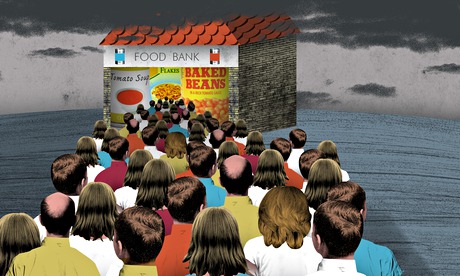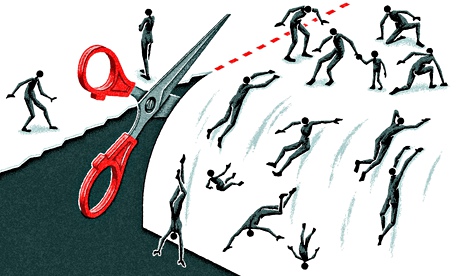Food banks are everywhere, and all the volunteers – like the many reports that have asked why food banks have proliferated – are agreed on the cause. It is cuts, delays and sanctions to benefits that have made Britain a hungrier nation than it was at the beginning of the Cameron term of government.
After 2010 a historic assault on the ideal of social security gradually emerged. But now, with the Conservatives threatening another largely unspecified £12bn in welfare cuts if they win the general election – the equivalent of 24 bedroom taxes, by the way – it’s time to stop interpreting the war on welfare. It is time instead to ask how to fight back.
The prerequisite is candour about how just much fighting back there is to do: the right has made all the political running. In 2013 George Osborne leapt on the freak case of Mick Philpott, from Derby, who had killed six of his own children in a house fire, to pose wider questions about the “subsidised lifestyles” of benefit claimants in general. One might have hoped that the Tories would pay a price for such a crude smear, but instead they are rewarded with such televisual poison as Channel 5’s Gypsies on Benefits & Proud.
Experts warn that the household benefit cap will leave some children in London being raised on 62p a day; and the supreme court concludes that the same cap, which arbitrarily punishes youngsters simply for being born into big families, is at odds with the UN convention on the rights of the child. No matter: the polls find that the voters now want the cap further reduced, and the Conservatives now promise to do precisely that.
So how on earth do you turn the tables in a debate that is doing such damage to so many vulnerable people? If winning over the rational mind was all that was required here, the arithmetic would be the place to start. One might attack the argument by pointing out that the £21bn in welfare cuts that the prime minister claims he has already made is considerably less than the sum he has given away in entirely discretionary tax cuts. Already by 2013 he had blown £24bn by freezing petrol duties, raising income tax allowances and cutting corporation tax. One might enter a further plea on behalf of the poor, that their pain could be very much relieved if only it could be shared with pensioners, who receive some 55% of all benefit expenditure and yet have – thus far – been almost immune from the cuts.
The right’s great advance against social security, however, has not come through a campaign of calculations – it has come through waging a culture war. To set about all the stories focusing on string-vested slobs lounging around on the sofa at the taxpayer’s expense, while armed only with statistics, is to invite certain defeat. I propose three principles of combat.
The first is to pick the right words – and to refuse to accept the jargon that masks so many horrors. The drift towards a US-style discussion about “welfare handouts” has been profoundly important. If, say, invalidity benefits were still described in old Beveridge terms of social insurance, the coalition could never have got away with time-limiting payments to people with permanent health problems, who had previously “paid a stamp”.
As it is, the payment in question is labelled “employment and support allowance: work-related component” – so nobody who’s not actually receiving it has any idea what it is for. Savage restrictions can be imposed in the name of taming a sprawling welfare monster, without the public having any real idea who is going to get hurt.
The left should take language lessons from the right. George W Bush and his friends reinvented America’s estate duty – a levy that raises revenue for the whole community exclusively from the wealthiest families – as a “death tax”. It proved a masterstroke. Since death and taxation are two grim necessities, imposing the latter at the point of the former sounds like a heartlessly cruel thing to do. The re-description opened up scope for an emotive campaign against the duty, which led to deep cuts, and came within a whisker of achieving permanent abolition.
Only one of the coalition’s benefit cuts has run into serious difficulties in the opinion polls: the “removal of the spare room subsidy”. It is surely no coincidence that this was also the only one to be successfully rechristened – as “the bedroom tax”. The moral is plain. Let’s style the next child benefit freeze as, I don’t know, “the great pram robbery”; or the next restriction on personal independence payments as “the wheelchair heist”.
The second imperative is to challenge what John Hills, of the London School of Economics, calls the “welfare myth of them and us”. One way to do that is to point out – as all of Hills’s numbers show – that benefits are not a resource for some underclass minority, but rather something that the vast majority of citizens will be grateful for at some point in their life. In raising children, in old age, even in burying our loved ones, most of us will have reason to seek out what is now called the “welfare budget” en route from cradle to grave. This needs to be hammered home.
Another way to transcend the “them and us myth” is to highlight the link between a shredded social safety net on the one hand, and degraded terms and conditions for workers on the other. Ukip has had plenty of success in arguing that migrants are pushing down pay. I suspect there would be mileage in explaining to the “strivers” how the war on the “skivers” is creating a desperate group of people on inadequate benefits who provide employers with a cut-price alternative to raising wages for all the workers who are already on their books.
The third and final rule of war should be: don’t waste time telling people not to be angry, but instead divert the fury that is currently trained on benefit claimants. There are other targets where a bit of rage might do some good. After all, we are only just emerging from the most severe squeeze on pay since the 1860s – it is natural that people who work hard for miserable rewards do feel hacked off.
The layabout on benefits is an obvious scapegoat, and a useful one for politicians who are keen to cut social security bills. It is, however, possible to think of villains of other sorts – particularly corporations. One of the only cases where the coalition was forced to back off on benefits occurred after Tesco was reported to be getting unpaid shelf stackers through a jobcentre “work experience” scheme. There was an outcry. Tesco and other PR-savvy corporations announced they would walk away unless the government backed down and removed the threat of benefit sanctions from the scheme’s participants. Chris Grayling, the then employment minister, was forced to cave in.
The lesson here is that, while the voters might not like scroungers on benefits, they dislike corporate sponging even more. If well-founded pleas in defence of the undeserving poor are falling on deaf ears, let’s turn the conversation round – to freeloading employers and the undeserving rich.











